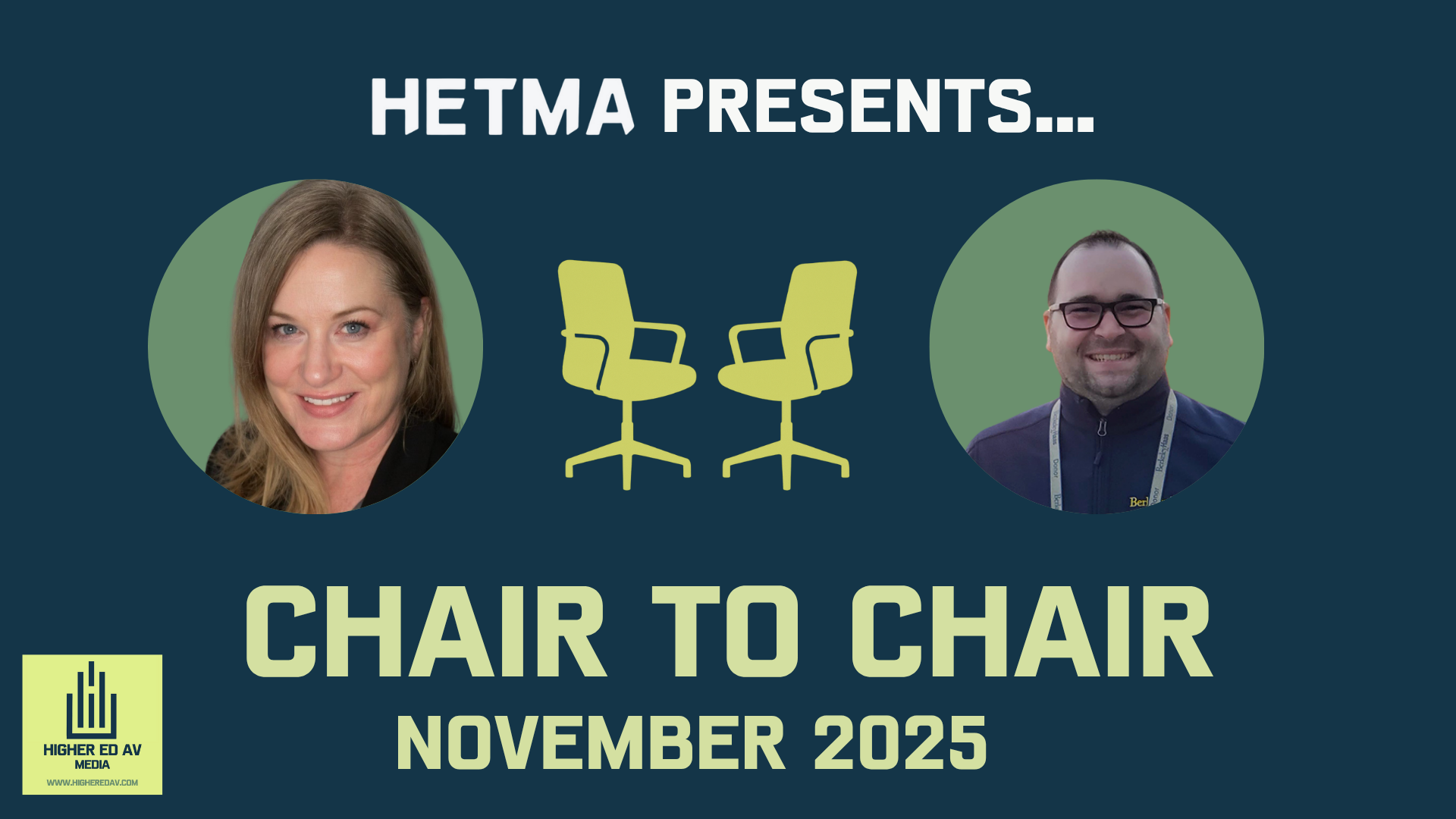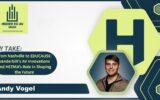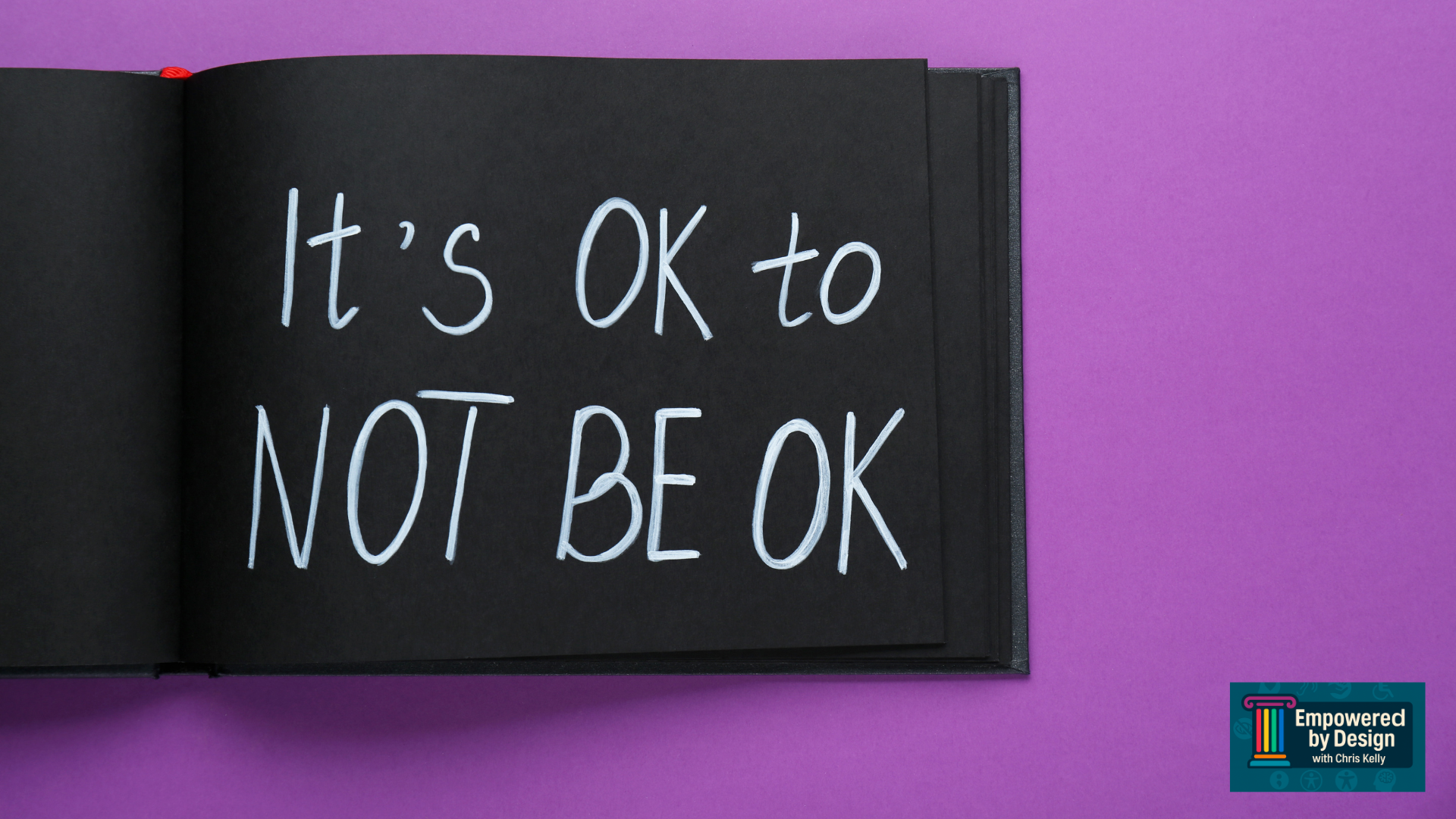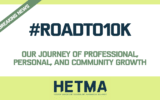




In this November edition of HETMA Presents… Chair to Chair, host Erin Maher-Moran sits down with HETMA Sponsorship Chair and UC Berkeley AV leader Matt Kaminski to explore the month’s theme: Pit Stop – Grounded Gratitude. Matt traces his unexpected path from ER, pediatrics, and labor-and-delivery nursing in France to becoming an Audio Visual and digital services leader in higher education at UC Berkeley, where he now steers AV and digital strategy for the College of Computing, Data Science, and Society. Along the way, he talks about capital projects, AV over IP, Zoom rooms, and how HETMA became the community where his ideas were finally understood—and validated.
The conversation gets deeply personal as Matt shares a recent life-threatening medical emergency that forced him to rethink boundaries, energy, and what “matters most” both at work and at home. From small wins like being invited to the executive table and seeing pilot projects become standards, to big-picture changes in how sponsors engage with higher ed, Matt unpacks what a true “win-win” sponsorship model looks like. He and Erin talk about the power of mentoring, community spaces like happy hours and lunch-and-learns, and how the Sponsorship program is evolving to include not just hardware companies, but the SaaS and AI platforms that now shape our AV/IT ecosystems.
Topics Discussed
- Matt’s journey from French ER nurse and EMT to AV and digital services leadership at UC Berkeley
- How 9/11 inspired his interest in U.S. emergency response and ultimately led him to Berkeley
- Moving from an admin role in the dean’s office into AV, capital projects, and campus-wide digital learning initiatives
- Finding HETMA as a place for validation, shared struggles, and professional recognition
- What the HETMA Sponsorship Chair role really entails beyond “getting sponsors”
- Building sponsor relationships that focus on partnership, feedback, and co-designed solutions instead of end-of-quarter sales pushes
- A near-fatal health scare in Hawaii and how it reframed his views on work, boundaries, and mental health
- Practical habits that keep him grounded: planning a week ahead, making space to decompress, and leaning on community conversations
- Celebrating benchmarks in big capital projects and moving from “one step forward, two steps back” to something more sustainable
- The future of HETMA sponsorships: including SaaS and AI platforms while keeping the program focused and manageable
Connect with Matt Kaminski
LinkedIn: https://www.linkedin.com/in/matthieu-kaminski/
Connect with Erin Maher-Moran
Email: ErinMaherMoran@hetma.org
LinkedIn: https://www.linkedin.com/in/erin-maher-moran/
Join the conversation with the HETMA community at community.hetma.org.
This show is a production of Higher Ed AV Media. Visit www.HigherEdAV.com for new content every day.
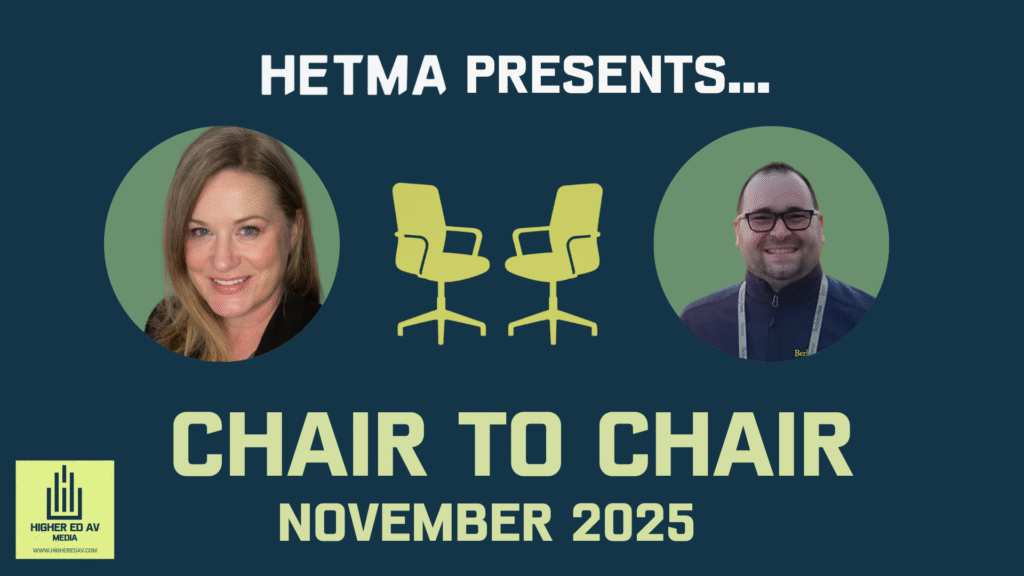
Grounded Gratitude and Win-Win Partnerships: A Conversation with HETMA’s Sponsorship Chair, Matt Kaminski
In higher ed AV, a lot of us have similar origin stories. We “fell into” this work from somewhere else—IT, media production, live events. But it’s not every day you meet someone who came to AV by way of ER, pediatrics, and labor-and-delivery nursing in France.
That’s where this month’s episode of HETMA Presents… Chair to Chair begins. Host Erin Maher-Moran sits down with Matt Kaminski, HETMA’s Sponsorship Chair and Audio Visual & Digital Services Program Director for the College of Computing, Data Science, and Society at UC Berkeley. The November theme is Pit Stop – Grounded Gratitude, and Matt’s story is a case study in what happens when career pivots, community, and reflection all intersect.
From French ER to Berkeley Capital Projects
Matt grew up and trained as a nurse in France, working in emergency rooms, pediatrics, and labor rooms. English is his second language, and AV wasn’t anywhere on his radar. After finishing nursing school, he planned to take a short break—choosing between mandatory service in Africa or a year in the United States. Inspired by what he’d seen of U.S. emergency medical response after 9/11, he chose the U.S., arriving in Berkeley as an au pair while also becoming an EMT.
He had no intention of staying in the country long-term. His profession, family, and life were back in France. Then he met someone, fell in love, and everything changed. After a period back in France to pay off his partner’s Berkeley tuition and re-establish his nursing career, they eventually returned to Berkeley together.
Nursing and EMT work, however, didn’t pay enough to sustain life in the Bay Area. Matt started looking for other opportunities and landed in the dean’s office at UC Berkeley in a basic admin role. That’s where his AV journey truly began.
Working closely with executives, he found himself pulled into the gray space between IT, facilities, operations, and events. He was arranging meeting spaces, helping with recording dean’s speaker series and graduations, and collaborating with central services to standardize how video and events were requested.
As he encountered bureaucracy and “we’ve always done it this way” thinking, he drew on his medical background—where teamwork and logical cause-and-effect are essential—to ask persistent “why” and “how” questions. That curiosity led him into capital projects, digital learning initiatives, and eventually a program director role with the new College of Computing, Data Science, and Society. Today, he’s helping shape one of the largest buildings on campus and using AV over IP, Zoom rooms, and new design methodologies to rethink what teaching and collaboration look like at scale.
Finding Validation in HETMA
By the time Matt found HETMA, he was already pushing for new ways of working on his campus: advocating for AV over IP, building Zoom room standards, and trying to keep AV from being an afterthought in major projects. But he often felt like he was hitting walls—struggling to “manage up,” get buy-in, and prove that his ideas weren’t just personal preferences.
He came to HETMA looking for two things: a place to share his story and see if others related to it, and some validation that he wasn’t alone in those struggles.
He found both.
Inside the HETMA community, Matt discovered that his “two steps forward, one step back” experience was a shared pattern rather than a personal failing. Other members were navigating the same tensions: trying to secure a seat at the table, fighting for long-term sustainable design instead of one-off fixes, and advocating for AV as a strategic asset instead of a line item.
That validation mattered. It helped him see his own work differently and gave him a community of peers who could weigh in on designs, proposals, and project strategies. When his ideas were vetted by a handful of HETMA colleagues, they suddenly carried more weight in local conversations.
Recognition followed. Matt received a Rising Star award, contributed to publications, and became a visible voice in the community. He also stepped into the role of Sponsorship Chair—a position that lets him connect the dots between higher ed practitioners and the manufacturers and SaaS providers who serve them.
A Life-Threatening Wake-Up Call
The episode takes a sharp turn when Matt shares a recent life event. Over the summer, he and his family went on vacation in Hawaii. Within three days, he found himself in a life-threatening medical situation—one he says could have ended very differently.
Without diving into clinical detail, Matt explains that this experience forced him to look hard at how he was living and working. The pace he’d been keeping since COVID—pushing through projects, reacting to constant change, and pouring energy into everything all the time—wasn’t sustainable.
As a former ER nurse, he’s deeply familiar with life-or-death stakes. That perspective is now part of how he frames his AV work. No matter how urgent a capital project feels, no matter how painful a delay is, nobody’s life is on the line if a room isn’t commissioned on schedule.
From that realization came a set of practical changes:
- Planning his week in advance so he isn’t constantly re-solving the logistics of his own time.
- Setting clearer boundaries around when he works and how much mental energy he gives to projects outside working hours.
- Acknowledging his own mental health needs, including the value of talking with peers and professionals rather than carrying everything alone.
He also emphasizes that vulnerability isn’t a weakness; everyone hits points in their life where they need help, and having open channels for those conversations is crucial.
Small Wins, Big Momentum
When Erin asks about small wins that matter, Matt pushes back on the idea that they’re “little.” For him, the last few years have been defined by a series of moments that, together, feel like a major inflection point.
He talks about:
- Moving from being the person with an idea in his head to someone who can show tested pilots, metrics, and examples from other institutions.
- Seeing his proposals taken more seriously because they’ve been road-tested in the HETMA community.
- Being invited to executive-level conversations where AV is part of long-term planning rather than brought in at the end.
He’s candid about the reality of capital projects. Progress is often iterative and slow, and pushing for change inside large institutions carries political and emotional risk. But he’s learned to celebrate benchmarks: a revised scope that aligns more closely with long-term needs, a budget conversation where AV is treated as essential infrastructure, or a project where pilots from two years ago are finally moving into production.
Those wins are fuel. They’re also proof that the “one step forward, two steps back” pattern can evolve into “three steps forward, one step back” with the right support, data, and relationships.
Sponsorship as a Two-Way Relationship
When most people hear “Sponsorship Chair,” they think “getting sponsors.” Matt’s view is much broader.
On one side of the equation, HETMA represents a large, focused community of higher ed technology professionals—a group that’s notoriously difficult for vendors to reach in a targeted way. On the other side are manufacturers and SaaS providers who want meaningful engagement, not just email blasts and cold calls.
Matt sees his role as building bridges between those two sides in a way that serves the community first, while giving sponsors clarity and impact.
A few principles stand out:
- Win-win or nothing: If a sponsorship doesn’t create value for the community and the sponsor, it’s not a good fit.
- Relationship over transactions: The best sponsors aren’t just asking, “When’s my lunch-and-learn?” They show up in chats, at happy hours, on advisory boards, and in committee conversations.
- Feedback as a design tool: With programs like the Approved Program and advisory sessions, HETMA can provide structured feedback that influences product roadmaps instead of just reacting to what’s already built.
- Reducing friction: By curating a list of engaged professionals, HETMA helps sponsors avoid the “Hail Mary” approach of guessing who to email and hoping for a response.
Matt notes that the sponsorship landscape is shifting. Many higher ed AV professionals report a noticeable difference in how key partners engage: fewer end-of-quarter pressure calls, more focus on long-term fit, and more openness to co-designing solutions.
Beyond Hardware: SaaS, AI, and the Edges of “AV”
Looking ahead, Matt is particularly excited about expanding HETMA’s sponsorship ecosystem beyond traditional hardware manufacturers. He points to software and AI platforms—tools that sit at the intersection of AV, IT, and collaboration—as obvious candidates for deeper partnership.
The challenge is balance. Go too broad and the program becomes chaotic and hard to manage. Stay too narrow and HETMA risks missing the tools that are actually shaping classrooms, meeting spaces, and operations.
His vision is to be intentional about which platforms to bring into the fold—solutions that meaningfully impact teaching, learning, and collaboration—while keeping the program structured enough that sponsors and members know what to expect from the relationship.
Community as a Safety Net
Throughout the episode, one theme keeps resurfacing: community as both a professional and personal safety net.
Whether it’s Third Friday happy hours, lunch-and-learns, mentoring relationships, or impromptu chat threads, Matt returns again and again to the idea that nobody should feel alone in this work. There’s always someone who has navigated a similar challenge—whether that’s a tough capital project, a complicated vendor relationship, or a moment of burnout.
He encourages listeners to:
- Show up to happy hours and community events, even if only occasionally.
- Reach out to potential mentors or mentees, regardless of where they are on the career ladder.
- Use the community to talk honestly about both technical and personal challenges.
For Matt, grounded gratitude isn’t just a seasonal slogan. It’s a practice: recognizing the people who’ve walked with you, the progress you’ve made even when you’re not at the finish line, and the partnerships that make the work possible.
As Erin closes the episode, she invites everyone to hit their own pause button this month: to name a small win, send the thank-you message you’ve been putting off, or acknowledge the colleague who quietly keeps everything moving. Matt’s story is a reminder that those moments of gratitude aren’t just nice—they’re what keep us going.
Want to keep this conversation going and share your own “grounded gratitude” moment? Join the community at community.hetma.org.

